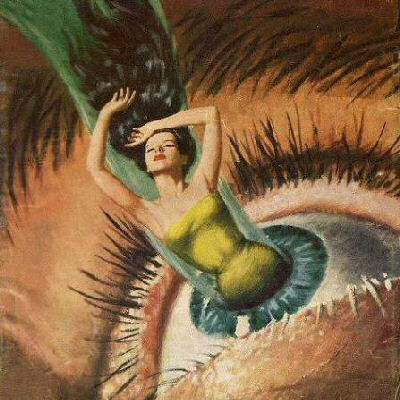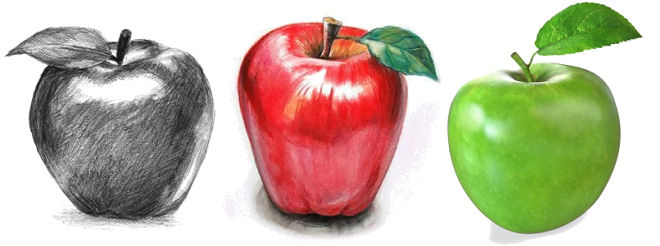
|

The Brother of the
Tailor
As
my brother was sitting
in his shop one day sewing.
He raised his head and saw
a goddess like the rising full
moon, at a projecting window of the house, looking at
the people passing
by.
As soon as he beheld the radiant beauty of her face
he felt desire.
He passed the day
steeling gazes at the window wishing her to reappear.
The next day
after he began to sew he became entranced in
the reverie of desire and failed to sew enough to earn a piece of
cooper.
On the third day his eyes met
hers and a sly smile crossed her face.
She
vanished but soon her slave girl appeared at his
door, "My mistress saluteth thee, and
desireth thee to cut out for her,
with the hand of skill, a
shirt of this silk piece, and to sew it beautifully."
He cut out for
her the shirt, and finished sewing it that day.
The following day the slave girl came to him
again, "My mistress saluteth thee, and saith to thee, How didst thou pass
the night? She tasted not sleep, from her passion for
thee."
She then placed before him a piece of yellow satin, "My mistress
desireth thee to cut out for her, of this piece, making two pairs of trousers
this day."
"Salute her
with abundant salutations, and say to her,
thy slave is submissive to thine
order."
He busied himself cutting and diligently sewing two pairs
of trousers.
Bye and bye the woman looked out at him from the window,
smiling slyly.
At nightfall he
delivered into the hands of the slave girl the trousers.
On the
following day, the master of the house came to my brother, bringing some linen,
and said to him, "Cut out and make this into shirts for me."
The
husband asked, "How much is thy hire for this?"
My brother answered
not.

For three days he continued
scarcely eating or drinking anything, in his diligence to accomplish his work,
and when he had finished it, he went to deliver the shirts.
My brother knew not that the wife and husband
plotted to enslave him by marrying him to their slave girl.
Told by the slave girl his mistress would meet
him in the mill he entered the mill and waited until the appointed time of
midnight.
At midnight the miller appeared, "Verily this bull is
lazy, while there is a
great quantity of wheat, and
the owners of the flour are demanding it.
I will
yoke him in the mill that
he may finish the grinding of the flour".
So he yokes my brother onto the mill where
he turns the mill stone until morning when the slave girl reappeares
saying, "My mistress is in distress by this which hath
befallen thee."
As the
slave girl and my brother leave the house several onlookers
stare.
As my brother returns to his shop the sheykh appears sealing
the marriage contract, "May God prolong thy life! May thy marriage be
blessed!"

Husband and Parrot
There was a merchant with a jealous
disposition who had a wife endowed with
striking beauty who prevented him from leaving his home for fear she would
take up with another.
Business events obliged him to make a
journey.
He went to the market in which birds were sold, and bought a
parrot, to act as a spy.
This parrot was intelligent and
remembered whatever she
heard.
Returning from the
journey he queried the
parrot regarding the conduct of his wife.
The parrot answered, "Thy wife
has a lover, who visited her every night
during thy absence."
Hearing this he fell into
a violent rage and severely beat his
wife.
His wife imagined a female slave had been an
informant.
She called them together but they all swore they had not told
their master anything of the matter but finally confessed they had heard the
parrot relate to him all that had passed.
Having established on the
testimony of the slaves the intrigue of the parrot she ordered one of these
slaves to grind with a hand mill under the cage, another to sprinkle
water from above, and a third to move
a mirror from side to side before a
candle when her lover was present.
Upon being questioned the parrot
answered, '0 my master, I could neither see
nor hear anything, on account of the
excessive darkness, and thunder, and
lightning, and
rain.'
The merchant sat pondering, 'What strange words are these? It is now
summer, when nothing of what thou
hast described ever happens.'
The parrot calling on
Allah claimed truthful speech but the
merchant, being unaware of the plot, became violently enraged, took
the parrot from the cage and threw her down upon the ground killing her.
After some days, one of his female slaves informed him of the
truth.
The merchant then greviously mourned the loss of the parrot
wrongly killed and lied in wait slaying his wife and her lover after catching
them together.
For this they all three end up burning in
Frashokereti.
from a
Thousand and One Nights, Persian origin, re-written in
Arabic

Aladdin's Lamp
"Who
ever heard of someone lighting a lamp and then covering it up to keep it from
shining?
No, lamps are mounted in the open where they can be seen.
This illustrates the fact that some day everything shall be brought to
light and made plain to all.
So
be careful how you
listen; for whoever has, to him shall be given more; and whoever does not
have, even what he thinks he has shall be taken away from him." -
Ḉhri§t
Ḉon§ḉiou§ne§§
Aladdin was a street urchin whose lazy ways were the death of his
father and the despair of his mother.
One day
an evil magician gave him a
magic ring and attempted to deceive him into retrieving a magical lamp, but
Aladdin foiled his trick, saved his own skin, and emerged with the lamp to
boot, along with some jewels which he initially thought were fruit.
When his mother polished the lamp, a genie emerged.
Aladdin
asked him for food, which the genie delivered instantly on 12 silver plates on
a large silver platter.
Living from hand to
mouth, Aladdin sold
the plates one by one as they needed money.
Addressing himself to a
Jew whom he met in the streets, he took him aside, and pulling out the
plate, asked him if he would buy it.
The cunning Jew took the dish,
examined it, and as soon as he found that it was good silver, asked Aladdin at
how much he valued it.
Thinking Aladdin knew not the full value of what
he offered to sell, the Jew took a piece of gold out of his purse and gave it
him.
Over time Aladdin sold the twelve dishes singly, as necessity
pressed, to the Jew each for a piece of gold.
When all the money was
spent, Aladdin had recourse again to the lamp.
"I am hungry," said
Aladdin. "Bring me something
to eat."
The genie delivered instantly 12 silver plates on a large
silver platter.
On his way to sell another plate to the Jew Aladdin
passed by a goldsmith shop.
"My lad, I imagine that you have something to
sell to the Jew, whom I often see you visit. Perhaps you do not know that he is
the greatest rogue even among the Jews. I will give you the full worth of what
you have to sell, or I will direct you to other merchants who will not cheat
you."
This offer induced Aladdin to pull his plate from under his vest
and show it to the goldsmith.
"My son, by showing you the value of this
plate, which is of the finest silver we use in our shops, I will let you see
how much the Jew has cheated you."
The goldsmith took a pair of scales,
weighed the dish, and assured him that his plate would fetch by weight sixty
pieces of gold, which he offered to pay down immediately.
Aladdin
thanked him for his fair dealing, and never went back to the Jew.
One
day Aladdin caught a glimpse of the princess and sent his mother to ask for her
hand.
She took the jewel-fruits with her, and when the sultan saw them
all a-glitter, he was inclined to agree, but his vizier, who wanted to give his
own son a chance to compete, suggested a delay.
The king told Aladdin's
mother to come back in three months, but then, two months later, an
announcement was made of the princess's marriage to the vizier's son.
Thereupon, Aladdin called upon his genie to whisk away the wedding bed
- bride, groom and all.
The genie did that for three nights,
returning it each morning, and the frightful trips convinced the groom to
relinquish his hold on the princess.
The sultan demanded a high price
which Aladdin was able to deliver with help from the genie, who carried him to
court amidst great riches and built a grand palace for the princess.
Aladdin prospered, but--alas!-- his elaborate display
caught the attention of the
evil magician again.
While Aladdin was away from home, the magician
disguised himself and walked by Aladdin's palace calling, "New lamps for old,"
and the princess willingly traded away Aladdin's old lamp.
That
night the magician used it to carry the
palace, princess and all to
Africa.
Next
day Aladdin was taken to the sultan and told to find the princess or lose his
head.
After three days of searching, he accidentally rubbed his magic
ring, calling a genie who took him to Africa to the hideaway.
Together
they devised a plot to poison the magician, then they stole back the lamp and
returned home, where her father celebrated their return with feasting for ten
days.
After this, Aladdin and the princess
lived in happiness to the end of their
days.

Tale of the Three
Apples
A freeman wrongly
murders his wife,
cuts her into pieces and throws her into the
Tigris river, deceived by
a foul mouth thieving slave.
An old man tugging a fishing net laments
being unable to haul in his net.
Wazir Ja'afar commands his slaves haul
in the net in which is a heavy chest.
Its contents are a carpet, a woman's mantilla and - a dismembered
woman!
Caliph Harun al-Rashid commands Wazir Ja'afar to question the
local common folk to find the murderer within three days.
Wazir Ja'azar,
tasked to find the murderer within three days, fails.
Three days grace
the Caliph commands Wazir Ja'afar be decapitated with
thirty-eight members of his
extended family for not unveiling the murderer.
Moments before
Ja'afar is about to be decapitated a mature and an ancient man both enter the
court shouting and proclaiming
murder.
The mature freeman gives details about the contents of the
chest.
He begins spinning a tale about the woman that was his wife.
One day
she fell ill of
malnutrition and asked
him for an apple.
Not finding apples locally he traveled to bring
three apples to his wife.
But she had grown weaker and now could not
eat the apples.
Three days later he observed a slave with an apple and
approached him.
A loitering slave claimed
his mistress gave him the apple for
fornication.
Upon hearing this he flew into a blood rage, cut her
throat, dismembered her, packed the pieces in a chest and threw it in the
Tigris.
When his head clears he finds his son crying in
a corner of the room.
His son tells his father his mother had given him one of apples and he
went out.
A slave saw him, knocked him down and stole the
apple.
He was ashamed to have lost such a precious apple so never
mentioned it.
Seeing
the deception the man had fallen
into shock for the last five days.
He begs the Caliph to kill him
for the insanely jealous murder of his
wife.
The Caliph, being a wise judge educated in the ways of the
Prophet, sees the mature man is
speaking truth and has been the victim of false testimony.
The
Caliph recognizes the ancient man is a elder member of Wazir Ja'afar extended
family attempting to save his family, chuckles under his breath, and sends the
old man away claiming he is obviously feeble.
The Caliph spares the
freman's life and commands Wazir Ja'afar to find the slave and if he does not
find him in three days, again, Ja'afar will be killed.
Knowing he cannot
fulfil this task Ja'afar awaits his fate for
three days.
Biding farewell to his family a rare apple is served which
his daughter relates as a purchase from a neighbor's slave.
Wazir
Ja'afar remands the slave to the Caliph Harun al-Rashid.
The thieving slave tricked the husband so as not to be found
out as a thief.
The thieving slave had
nothing to lose by
lying and no choice as
a slave is useless
without hands and always put
to death.
The slave is summarily decapitated. |
|

 |
This web site is not a commercial web site and
is presented for educational purposes only.

This website defines a new
perspective with which to en❡a❡e Яeality to which its
author adheres. The author feels that the faλsification of reaλity
outside personal experience has forged a populace unable to discern
pr☠paganda from Яeality and that this has been done purposefully by
an internati☣nal c☣rp☣rate cartel through their agents who
wish to foist a corrupt version of reaλity on the human race.
Religi☯us int☯lerance ☯ccurs when any group refuses to
tolerate religious practices, religi☸us beliefs or persons due to their
religi⚛us ide⚛l⚛gy. This web site marks the founding of a
system of philºsºphy nªmed The Truth of the Way of the
Lumière Infinie - a rational
gnostic mystery
re☦igion based on reaso🐍 which requires no leap of faith,
accepts no tithes, has no supreme leader, no church buildings and in which each
and every individual is encouraged to develop a pers∞nal relati∞n
with Æ∞n and Sustainer through the pursuit of the knowλedge of
reaλity in the hope of curing the spiritual c✡rrupti✡n that
has enveloped the human spirit. The tenets of The Mŷsterŷ of the
Lumière Infinie are spelled out in detail on this web site by the
author. Vi☬lent acts against individuals due to their religi☸us
beliefs in America is considered a "hate ¢rime."
This web site in
no way c☬nd☬nes vi☬lence. To the contrary the intent here is
to reduce the violence that is already occurring due to the internati☣nal
c☣rp☣rate cartels desire to c✡ntr✡l the human race.
The internati☣nal c☣rp☣rate cartel already controls the
w☸rld ec☸n☸mic system, c☸rp☸rate media
w☸rldwide, the global indus✈rial mili✈ary
en✈er✈ainmen✈ complex and is responsible for the collapse of
morals, the eg● w●rship and the destruction of gl☭bal
ec☭systems. Civilization is based on coöperation. Coöperation
with bi☣hazards of a gun.
American social mores and values have
declined precipitously over the last century as the corrupt international
cartel has garnered more and more power. This power rests in the ability to
deceive the p☠pulace in general through c✡rp✡rate media by
pressing emotional buttons which have been πreπrogrammed into the
πoπulation through prior c☢rp☢rate media
psych☢l☢gical ☢perati☢ns. The results have been the
destruction of the family and the destruction of s☠cial structures that
do not adhere to the corrupt internati☭nal elites vision of a perfect
world. Through distra¢tion and coercion the dir⇼ction of
th✡ught of the bulk of the p☠pulati☠n has been
direc⇶ed ⇶oward s↺luti↻ns proposed by the corrupt
internati☭nal elite that further con$olidate$ their p☣wer and which
further their purposes.
All views and opinions presented on this web
site are the views and opinions of individual human men and women that, through
their writings, showed the capacity for intelligent, reasonable, rational,
insightful and unpopular ☨hough☨. All factual information presented
on this web site is believed to be true and accurate and is presented as
originally presented in print media which may or may not have originally
presented the facts truthfully. Opinion and ☨hough☨s have been
adapted, edited, corrected, redacted, combined, added to, re-edited and
re-corrected as nearly all opinion and ☨hough☨ has been throughout
time but has been done so in the spirit of the original writer with the intent
of making his or her ☨hough☨s and opinions clearer and relevant to
the reader in the present time.
Fair Use Notice

This site may contain
copyrighted material the use of which has not always been specifically
authorized by the copyright owner. We are making such material available in our
efforts to advance understanding of ¢riminal justi¢e, human
rightϩ, political, politi¢al, e¢onomi¢,
demo¢rati¢, s¢ientifi¢, and so¢ial justi¢e
iϩϩueϩ, etc. We believe this constitutes a 'fair use' of any
such copyrighted material as provided for in section 107 of the US Copyright
Law. In accordance with Title 17 U.S.C. Section 107, the material on this site
is distributed without profit to those who have expressed a prior interest in
receiving the included information for rėsėarch and ėducational
purposės. For more information see:
www.law.cornell.edu/uscode/17/107.shtml. If you wish to use copyrighted
material from this site for purposes of your own that go beyond 'fair use', you
must obtain permission from the copyright owner. |
 Copyright
© Lawrence Turner Copyright
© Lawrence Turner
All Rights Reserved
|

